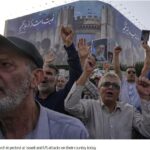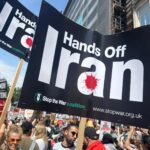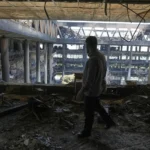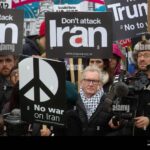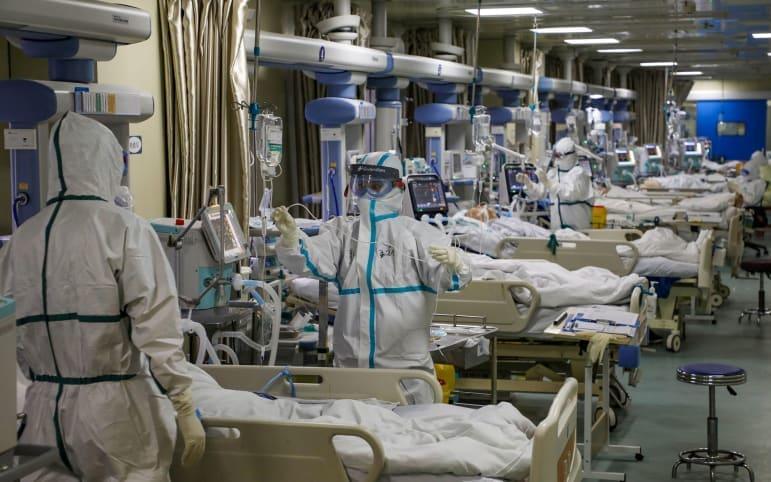
2nd April 2020
The Committee for the Defence of the Iranian People’s Rights (CODIR) has appealed to trade unions in the UK and internationally to support their fellow workers in Iran who are at the epicentre of the coronavirus pandemic.
CODIR has accused the Iranian regime of gross irresponsibility and negligence in its approach to the pandemic. While there were widespread indications that the virus had reached Iran in January, the regime refused to acknowledge its presence or take any measures to prevent its spread.
CODIR cites as evidence of the regime’s negligence the fact that the regime wanted mass participation in the celebrations marking the 41st anniversary of the 1979 Revolution on 11th February, as well as encouraging high turnout for the parliamentary elections that took place on the 20th February.
In addition, certain influential and powerful interest groups continued to operate flights carrying passengers and goods from areas in China affected by the coronavirus for weeks afterwards.
These desires flew in the face of basic measures to counter and contain the outbreak of the virus within the country. The regime only announced the first two coronavirus deaths on the afternoon of polling day when the election was already well underway. By then the virus had taken a hold throughout the country. Dr Iraj Malekzadeh, Deputy Health Minister admitted in mid-March that The Iran only announced the first CoVID-19 case when the crisis had reached its peak in Qom and other cities.
Recent official figures on 1st April indicated that the total number of cases in the country stood at 47,593 with 3,011 new cases and the number of dead exceeding 3000 mark, with 3873 patients in a critical condition, though these figures are believed to be gross underestimates.
While the country’s under resourced and over stretched health sector struggles to deal with the pandemic the sanctions imposed upon the regime by the United States have not only been kept in place but expanded.
The US is refusing to spare Iranian people from the negative impact of the sanctions, which affect the availability and provision of food and medicine while destroying the economic fabric of the country. The United Nations and a leading European powers including Britain, France and Germany have officially called on the US to remove the sanctions in order for a humanitarian relief effort to take place to help the beleaguered country’s people.
Against this background the fate of political prisoners is also cause for particular concern. Prisoners are kept in overcrowded and unsanitary conditions and are subject to routine mistreatment. Since early-February there have been continual calls for the release of political prisoners or for them to at least be granted temporary leave.
Just before the Iranian New Year on 20th March, the regime grudgingly assented to the release of thousands of prisoners, including a number of well-known trade union leaders, activists, human rights lawyers and women’s equality campaigners. However, those political prisoners with a sentence of longer than 5 years were excluded from the release. Amongst this number are several women’s rights campaigners, such as Atena Daemi, and trade unionists, such as the ITTF’s Mohammad Habibi.
The regime is refusing to support the call for the provision of a safe environment for emergency work to be carried out and is not providing guarantees for workplaces that decide to stop production owing to the pandemic. This means that workers are coerced into going to their workplaces despite the dangers rather than being left jobless, destitute and hungry.
Assistant General Secretary of CODIR, Jamshid Ahmadi, has condemned the regimes negligent approach and stressed that failure to contain the virus in Iran is an international threat.
“The regime must develop an effective response to take even the most basic measures to try and counter the coronavirus”, said Mr Ahmadi, “Its devastating impact upon the Iranian population is bad enough but the threat of increasing infection and not containing the spread across the region is a real danger.”
CODIR is calling for trade unionists internationally and in the UK to back its demands that the government in Iran release all political prisoners from the prison system and their places of detention.
Equally CODIR are pressing for the proper resourcing of the country’s health service to ensure a nationwide response that cares for the poorer and lower-income sections of the population who are bearing the brunt of this crisis.
ENDS
Further information for Editors
Contact Information for CODIR:-
Postal Address:
B.M.CODIR
London
WC1N 3XX
UK
Website: www.codir.net
E-mail: codir_info@btinternet.com
Further information on CODIR
CODIR is the Committee for the Defence of the Iranian People’s Rights. It has been established since 1981 and has consistently campaigned to expose human rights abuses in the Islamic Republic of Iran.
CODIR has worked closely with the trade union movement in the UK, the peace movement, all major political parties and Amnesty International to press the case for an end to torture in Iran’s prisons. CODIR proudly lists amongst its affiliates several major trade unions in the UK – including UNITE, UNISON, NEU, NASUWT, UCU, RMT, FBU and others.
CODIR has published Iran Today, its quarterly journal, since 1981, explaining the latest developments in Iran and the most effective way that the British public opinion could demonstrate its solidarity with the people of Iran.
In recent years CODIR has worked closely with Stop the War Coalition and has been vocal against any form of foreign intervention in the internal affairs of the nation.
Giants of the left and trade union movement in Britain, such as Tony Benn (MP), Rodney Bickerstaff (former General Secretary of UNISON), and Ken Cameron (former General Secretary of FBU), were amongst CODIR’s most steadfast supporters.







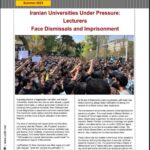
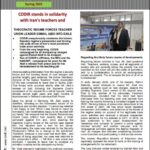




 Posted in
Posted in 
